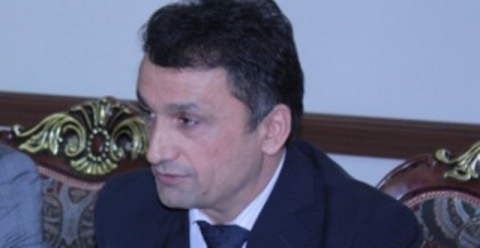Freedom from Torture
Civil Society Coalition against Torture and impunity in Tajikistan

Across the former Soviet Union, entrepreneurs may be skilled in the art of making money, but they soon find themselves out of their depth when it comes to the business of politics.
The poster boy for the inadvisability of trying to make the cross-over from business to politics is, of course, Mikhail Khordokovsky, the one-time Russian oil magnate who has been imprisoned since 2005. There is also the example of Kazakhstan’s Mukhtar Abylyazov, a co-founder of the Democratic Choice Movement that briefly challenged President Nursultan Nazarbayev’s authority in the early 2000s. Ablyazov is now in exile, hounded by a protracted and expensive embezzlement case against him.
The latest example of an oligarch falling on hard times after challenging established authority is Tajikistan’s Zaid Saidov, a well-known businessman and former minister of industry who was detained May 19 at Dushanbe Airport upon arrival from a trip abroad. He is facing embezzlement and polygamy charges.
Only last month, Saidov emerged as a driving force behind the formation of New Tajikistan, a group comprised largely of businessmen and intellectuals who promised to focus on economic development. The party made it clear it had no interest in fielding a candidate for the presidential election this autumn. Yet it also stressed it was not a “pocket” party designed simply to create the appearance of a more vibrant political playing field in Tajikistan.
Investigators at the state anti-corruption agency are currently holding Saidov, 55, according to local media reports.
New Tajikistan members say Saidov was targeted for his political activity, stressing that he must have become a source of concern to long-serving President Imomali Rahmon, who is expected to run for another term this year.
Saidov’s party colleagues tend to avoid commenting on the record for fear of suffering a similar fate, or making his situation worse. Saidov denies the charges against him, including taking a $100,000 bribe while minister of industry and embezzling $400,000 during the construction of Dushanbe’s tallest building.
On social networks, loads of Tajiks are lamenting what they call the worst political crackdown since independence from the Soviet Union in 1991. Many in Dushanbe’s chattering class feel Saidov’s ties to Russia, in particular the Russian business community, may have factored significantly in his arrest. Moscow is engaged in a protracted negotiation with Rahmon over the fate of a Russian army division stationed in Tajikistan. Media in both countries have speculated that Moscow, reportedly vexed, may be interested in finding a replacement for Rahmon to lead the former Soviet republic.
On May 10, several newspaper editors received a letter alleging that Saidov had ties to a now-deceased Islamist guerrilla leader. At the time Saidov was in France, acting in his capacity as head of Tajikistan’s National Table Tennis Federation, accompanying the national team during a tournament. On May 11, police searched his home and questioned his family members, reportedly hauling all, including a five-year-old, to a police station. This week authorities began auditing his businesses and, Dushanbe’s Asia-Plus news agency reported, pamphlets discrediting Saidov began appearing around town. State television has gone on the attack too, airing programs that accuse Saidov of perpetrating vast economic crimes.
Prominent religious leader Haji Akbar Turajonzoda says the case demonstrates the incumbent administration’s intolerance of even the potential for dissent. “Unfortunately, the reality in Tajikistan is such that anyone who wishes to participate in running the country, irrespective of his or her good intentions for the sake of the people and motherland, is going to face retribution,” Asia-Plus quoted Turajonzoda as saying on May 20.
Some opposition politicians have publicly expressed their support for Saidov. The Islamic Renaissance Party of Tajikistan (IRPT) – which itself has come under withering attack in recent months – has called the case against Saidov “purely political” and “biased.” In a May 21 statement, the party asked why authorities waited until now to level corruption charges that date back to his time in government; Saidov left his post in 2006.
Fostering suspicion that Saidov’s allies are being pressured to turn on him, on May 13, while he was still abroad, the general assembly of the Coordination Council of Business Associations, a lobby he headed, voted to dissolve the body. Several former colleagues accused Saidov of using the council as a platform for his political agenda. Mikhail Petrushkov, a council member, told EurasiaNet.org that the members did not present any evidence of abuse of power. “In the presence of Saidov, the council members would always applaud him and support his proposals. Now, when he is absent, they have declared him incompetent.”
“The decision to liquidate the council will have political consequences,” Petrushkov added. “The move will spoil the image of Tajikistan and have a negative impact on Tajikistan’s investment climate.”
Saidov is not the only political figure in Tajikistan to come under pressure in recent months. The IRPT has faced near-constant harassment as the elections approach. On April 19, a senior party official was savagely beaten outside his home. And earlier this month the head of the party in the restive eastern mountains was sentenced to 14 years in prison on charges that Freedom House says appear to be part of a “sustained campaign to eliminate the government’s main rivals.”
The IRPT is considered the only clear-cut opposition group in Tajikistan’s rubberstamp parliament; it holds two of the legislature’s 63 seats.
In March, the head of Tajikistan’s Uzbek community went missing shortly after declaring his support for another opposition figure. He has not been heard from since. Many suspect Salimboy Shamsiddinov, who was beaten in broad daylight by unknown assailants in front of the local KGB building last year, was singled out for his political activities.
Authorities have also targeted opposition-minded figures abroad, attempting to extradite a former premier from Kiev (that case failed) and a critic currently being held in Dubai.